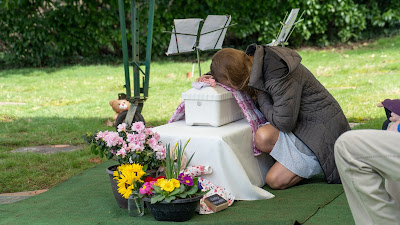Forsaken Friday
Have you ever agonized over something?
If you’re like me, the word “agony” didn’t really affect me until I actually experienced it.
It was agonizing to choose an induction date, along with the other decisions we were asked to make before Hallelujah’s delivery. We were asked to choose what our daughter’s life would look like. Would it be tubes and needles and tests and incubators? Would it be skin to skin and sister snuggles?
If you’re like me, the word “agony” didn’t really affect me until I actually experienced it.
It was agonizing to choose an induction date, along with the other decisions we were asked to make before Hallelujah’s delivery. We were asked to choose what our daughter’s life would look like. Would it be tubes and needles and tests and incubators? Would it be skin to skin and sister snuggles?
Would it be some combination of these two? There were pluses and minuses to each agonizing decision – there was no “right” answer. Even now, looking back, I’m not convinced I made the right choice…I can never know how the other way would have played out…and that, my friends, is agony.
Agony is defined by Merriam-Webster as intense pain of the mind or body.
Synonyms: anguish and torture.
Agony is defined by Merriam-Webster as intense pain of the mind or body.
Synonyms: anguish and torture.
The ancient Greeks coined the term “agonia” to describe the feeling of fear an athlete feels before a contest; the kind of struggle that emphasizes mental pressure that you can physically feel in an intensely personal way. This is the pain you feel when you are asked to decide on end of life care for a baby yet to be born. This is the pain you feel when you have been laboring for over 24 hours, but are scared an epidural could jeopardize your baby. This is the pain you feel as you smile that she’s breathing, smile that she’s alive, but you watch her chest rise and fall with such effort that you wonder, “how long do we have?” This is the pain of putting your kids to bed not knowing if their baby sister would be alive in the morning. This is the pain of holding my tiny baby as she turned grape purple and arched into her first of three seizures. This is the pain, the weighty heart crushing pain, of telling your baby that it’s ok to stop fighting. And saying it again the next day. And saying it again the next day, as she refused to stop fighting. This is agony.
Merriam-Webster also defines agony as the struggle that precedes death. This is Jesus-in-the-garden type of pain.
Literally.
The only time the word “agonia” is used in the Bible is describing Jesus praying and sweating in agony.
We did a lot of praying and sweating over the last 5 months.
Today is Good Friday, and for the first time, I’m getting a glimpse into the pain that God the Father must have felt when his Son asked Him if there was any way to remove what he knew awaited him on the cross. For Jesus, it wasn’t just death that he was agonizing over, it was the weight of sin, and the mandatory, yet momentary separation from his Father. For the first time, God the Father would not be in full communion with his Son. In that moment when the sins of the world were placed on Jesus’ shoulders, Jesus became sin for us. In that moment, Jesus cried out, not saying “Father” (as he had addressed God in the Garden), but instead He cries out, “Eli, Eli, lama sabachthani” – which is translated “My God, my God, why have you forsaken me?” He was no longer in the presence of his Father. He was forsaken. Left behind. Abandoned. Deserted.
Why?
For love.
He suffered that for us.
We did a lot of praying and sweating over the last 5 months.
Today is Good Friday, and for the first time, I’m getting a glimpse into the pain that God the Father must have felt when his Son asked Him if there was any way to remove what he knew awaited him on the cross. For Jesus, it wasn’t just death that he was agonizing over, it was the weight of sin, and the mandatory, yet momentary separation from his Father. For the first time, God the Father would not be in full communion with his Son. In that moment when the sins of the world were placed on Jesus’ shoulders, Jesus became sin for us. In that moment, Jesus cried out, not saying “Father” (as he had addressed God in the Garden), but instead He cries out, “Eli, Eli, lama sabachthani” – which is translated “My God, my God, why have you forsaken me?” He was no longer in the presence of his Father. He was forsaken. Left behind. Abandoned. Deserted.
Why?
For love.
He suffered that for us.
So, when I think about being separated from Hallelujah, I think about Jesus. And I think about how He chose to lay down His life for me and for my daughter, and how He chose to obey even when it was hard. And because He submitted to His Father and bore that separation, we never have to. I am momentarily separated from my baby, but neither of us has ever been separated from our Heavenly Father. My baby is in heaven waiting for me someday. Our separation is not permanent. We will be restored. We will get new bodies. My baby is no longer broken.
I imagine her breathing deeply the smells of daphne, turning her ear to the hum of a flowering cherry tree, and laughing with her siblings and cousins as they run through a sprinkler for the first time. I really look forward to hearing that beautiful laugh someday.








Comments